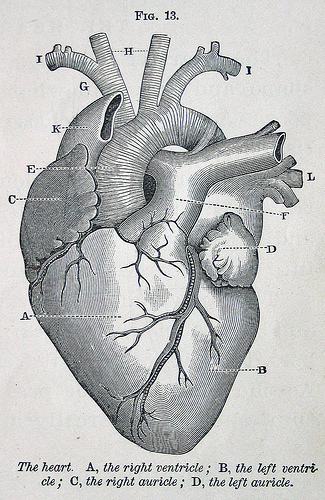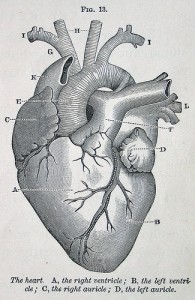For the next five years, my heart behaved itself. I played soccer, climbed a couple of mountains, rode my bike, and all the time my heart beat faster or slower as need demanded. It didn’t particularly worry me that we never knew what had gone wrong that first time. It never occurred to me that I knew nothing at all about what makes a heart go faster or slower, or what makes it beat at all. Ironically, as an essayist I looked into my heart all the time, but only in the introspective sense. I even turned down an offer to develop my experiences and reflections on my cardiac adventure into a book. Sorry, I said. Nothing happening any more. And that’s pretty much how and where the story picks up again, just a few weeks ago.
Shock Treatment
It was a Monday night in late July, over the summer break. For once I had actually had something approximating to a vacation, a week on Nantucket, cycling every day, reading books, playing guitar. Felt as fit as I had done any time in the past five years.
Two weeks later, around midnight, unable to get to sleep and lying on the couch, the old barrel-of-monkeys feeling returned, swiftly, without warning. My heart was thumping hard and fast at the base of my throat, then stopping, then thumping hard and fast again.
It was a shock—in fact, it was exactly the kind of shock that happens when I’m on a long overnight flight, and relax enough to be drifting off to sleep, and then something terrifying happens: maybe the plane bumps slightly, maybe it’s my own anxiety creating the fall, but I feel as if I start falling, shoot out a hand and catch myself. Sometimes the feeling forces its way into a dream, and I start falling backwards off a tree branch and just manage to grab hold…. It almost doesn’t matter. It’s the aftermath that matters, that horrible sense that some kind of catastrophe was just averted, and now I’m awake and sweating, and my heart is hammering in my ears.
This time there was no plane, or maybe I myself was the plane I was falling out of; and this time the shock was so great that my heart was spastic. In those five years I’d forgotten how disturbing, how wrong it feels to lose one’s rhythm. I’d almost forgotten my heart was even there.
Once again I went through everything I’d tried the first time. Holding my breath in. Holding my breath out. Reading. Taking a bath. Nothing worked. If I lay down my heart felt ten times its normal size, bashing around my chest and up into my gullet. If I stood up I felt light-headed. Sometimes I’d get three or four normal beats in a row—a dozen would have felt like a miracle—but then a beat would get lost altogether, or ten double-time beats would charge in, and the illusion that things were settling down was trampled to death.
This went on all night. Midnight until around 7 a.m. By then there was no longer any way to deny it: I had to go to the emergency room. I tiptoed into the room where Barbara was sleeping, woke her and asked her to give me a ride. She would need the car during the morning—better she drop me off than I just drive myself, light-headed and all.
At 7:30 a.m. on a Tuesday morning, the place was almost empty, and I was admitted at once. Over to a bed, shirt off, gown on, electrodes sticking to the hair on my chest, the monitor beeping on and off all the time, either because my heart was going crazy or because the electrodes couldn’t get a good contact. Some shaving. As before, an IV and diltiazem to slow the racing pulse. A nurse, a tech, and a doctor with the ultra-fit buzz-cut build of an action figure but a confident and calming manner.
So the monitoring began. Barbara decided to stay. My heart slowed, but beat as erratically as ever.
Another patient was admitted and shown to the bed next to mine. Either some extraordinary and eerie coincidences are guiding me or else there’s far more a. fib. around than I thought, because just like five years ago, the patient in the bed next to me also suffered from a.fib.
Just as was the case last time, it was a middle-aged man, blue-collar background, whose symptoms were considerably worse than mine. This time the guy had been suffering from several years, and was on both beta-blockers and blood-thinners. Even so, he’d come into the hospital because he’d had a series of attacks that had been going on for three days. Three days!
Hs presence also reminded me that there’s always someone else who is worse off than I am—and as if to underline that, I overheard someone at the nurse’s station call, “Can someone sit with the patient in bed 37? Suffering from suicidal ideation.”
This strange, half-tense, half-drowsy state persisted for two hours. The action-figure doctor,who in civilian life was called Peter Weimersheimer, started saying things like “Well, if there’s no change, we’ll just convert you.”
I recognized a euphemism when I heard one: this was the defibrillator, the paddles, the galvanic twitch of the body on the gurney. It wasn’t until he brought the subject up for the third time that he used the phrase “shock you,” and I appreciated his efforts to keep panic at bay.
By about 10 a.m. it was clear nothing was going to change in the ER, and nothing was to be gained by going home. “Let’s do it,” I said.
They were going to give me a quick-acting sedative through my IV, Weimersheimer said, and also some painkiller. I assumed the painkiller was so I wouldn’t feel too bruised and beaten up when it was all over, but he gave a different reason. Even though I wouldn’t know or feel a thing during the cardioversion, he told me, fumbling for his words a little as if all this New Age stuff still sounded a little strange to him, he felt as though patients with a little painkiller in them seem to react…um…less during the procedure, seemed to tolerate it better. Even in my dopey state, I realized that this was a hint: while it was true that everything about the cardioversion was routine and effective, he was saying, it was also violent and alarming, at least to those who were conscious and watching.
“You don’t have to stick around,” I told Barbara, suspecting that the whole episode might be as distressing for her as it was for me—but she insisted, and pulled out her iPhone.
“I’m going to film it,” she said.
This struck me as a potentially terrible idea, but my job right now was to let the world drift away. The nurse fiddled with my IV, and I began to feel distinctly mellow. I closed my eyes, then vaguely opened them, then closed them again.
“How are you feeling?” the nurse asked.
“Very relaxed,” I slurred. Mentally, I rolled over and cocked an ear to my own chest. My heart was quiet. Quiet, as in pulsing regularly and gently, its voice faded back into the general background noises of my body. I was blurrily delighted. The sedative must have quietened it back into normality.
“Hey, it worked!” I said cheerily, if still a little fuzzily.
“Yes, it did,” Weimersheimer said, and seemed to withdraw along with his retinue until only the nurse and Barbara were left.
“How are you feeling?” Barbara asked again–and something about the way she asked made me realize that something had happened to make her ask that question in that tone. It took me a while, but I finally got it: the cardioversion had taken place without my having the slightest knowledge of it, all over in less than five minutes, and the only way I could tell was that the right side of my upper chest, between my collar-bone and my nipple, felt as though someone had punched it.
I got dressed, feeling a little odd, was given a summing-up sheet that said my diagnosis was atrial fibrillation, and we went home.
By now it was almost noon. I lay around the house, feeling benign but oddly incurious. Now that it was over, this attack, this procedure I’d dreaded, what had I learned? When anything as strange and new and threatening as this is over, what you’ve mostly learned is that it’s over. I didn’t want to follow up with the cardiologist or my family doctor. I didn’t want to watch the video Barbara shot with her phone. What I clung to instead was that it was over and had, in fact, been fixed in five minutes using a procedure that I didn’t even know had happened. How easy! How swift! For most of Tuesday the cardioversion had the qualities of a magic spell: the demon had been killed, and could be killed at will whenever necessary. All I felt, at first, was the wonderfully mellow after-effects of the morphine and the conclusion that I didn’t have to think about atrial fibrillation any more.
That tranquility lasted until late afternoon. By then, odd signs were surfacing. My right pectoral area felt bruised, as if it had been punched. I’d forgotten that morphine makes you constipated. Some of the skin cells on my chest had been ripped off along with the defibrillator pad, and that area smarted, then stung, then felt so raw I had to ice it in order to get to sleep. And by then my back and knees were aching something fierce. It was as if all my innards had been violently shaken—as, of course, they had. The science had lost its magic: I wasn’t so keen on going through all this again, after all.
As you can probably gather, this is by no means the end of the story. I hope you’ll follow as I add new chapters every few days and continue to explore both the narrow subject–atrial fibrillation–and the broader subjects, such as the heart itself, and what Whitman called “the body electric.”
I also hope you’ll forward this to anyone who has arrhythmia. This may possibly turn into a book, in which case I need all the help I can get from others, whether what they have to offer is answers or questions.
Back soon.


